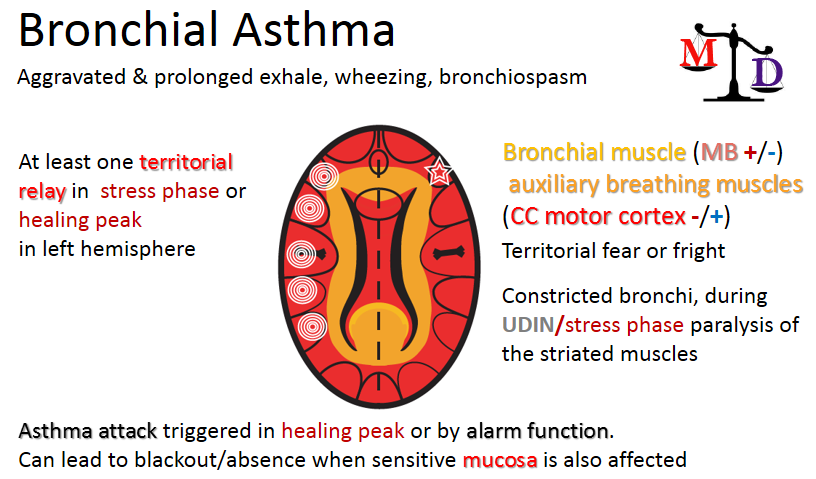Lung diseases and respiratory problems can improve and heal when we address their emotional background!
Listen to doctors and therapists sharing amazing case experiences, as well as the challenges in prevention and treatment of these afflictions, on the 8. Intl META-Health Conference in Mumbai:
with Dr Abhas Desai, Rob van Overbruggen, Dr Anton Bader, Walter Reiner and Dr Kwesi Anan Odum.
Summary transcript:
Dr Abhas Desai: I think asthma is a easily curable disease. If pulmonary fibrosis can be corrected, anything can be corrected.
I had many cases. Like, the mother died, the father remarried, the child didn’t feel loved by the stepmother, and slowly she developed asthma.
Dr Kwesi Anan Odum: It’s the same pattern that there is somebody in your territory that you don’t want to inhale. You don’t want to get that person inside your system, so you’re reacting on that level! One might get bronchitis and the other might get fibrosis – and there we need more understanding why there is the difference in the reaction.
Dr Abhas Desai: It also happened in the previous case for the daughter in law. There is the feeling of not being accepted, not being loved.
In India, what is happening, supposing you have cold and cough and fever for 5 days, you go to a family doctor, he will give you 2 or 3 days’ medicine. If you are not better, he will refer you to a physician. The way he will tell you, “you go and consult a physician because it is not cured in 3 days, so I fear you may need an investigation”. So the patient already is afraid. When he goes to the physician, he will be given an antibiotic and cough syrup and expectorant and this and that, and be told “take this for 5 days. If you’re not better, we’ll go for x-ray tests.”
As soon as the patient leaves the chamber, he’s thinking “What if I’m not fine by 5 days? What if I’m not fine by 5 days?” So the funny thing is, instead of taking care of the fear he came with in the first place, they are making him even more afraid. And when this goes for 10 days it can be tuberculosis, it can be lung cancer, it can be this and that. He gets down. But even with nothing pathological except coughing or breathlessness, after 10 days the medical system creates panic and fear instead of calming the patient “take it easy, we’ll see if anything changes.” The focus on investigation can create more problems, that’s what I feel.
Rob van Overbruggen PhD: I’ll share a very specific case of asthma. I flew to the US to help a patient who suffered from asthma attacks. Because of his background he was really good at emotional release, so we started experimenting. We found what the emotional background was that might have triggered the asthma attacks (as long as we can’t trigger them we’re never sure): for him it was the loss of his previous business. Someone had joined the business, stole the whole business and took it over. So I asked “Do you want to play with that?” – “Yes”.
So he got back into the trauma and felt the entire energy of the event. His face was really angry, when I took him back out again, out of his trance, for a break just to notice what happens. And we went in for a break; just after the break we started again: “How was it? How was the break?” And he reported: “I wanted to go for my inhaler, and then I suddenly realized what you did and how you triggered this attack! So I put it away, felt at ease, and everything was normal”. So that’s an example of the 2 phases and when you look it up, you see that the asthma attack actually happens after the emotion has been released a little bit. That’s how you can play with symptoms.
Dr Anton Bader: Because I was concerned myself, I want to share that it’s not so easy to let go of old feelings! I needed 9 months to change my old habits. I had always been afraid of cold, when the wind was blowing my lungs used to react. I had to learn to change my evaluation of cold to change my reaction to it – but now I feel free to wash my hair and go out to let the wind dry it even in freezing weather, and nothing happens to me! This fills me with joy.
Dr Kwesi Anan Odum: Thank you very much! I want to share how I was invited to Egypt and 10 days before the travel I had an asthma attack. I had asthma as a kid, and it had to do with our family moving between Ghana and Germany, and facing racism which was a real conflict for me. I thought I had overcome it, and then there was an incident between two people who I really liked. They had a conflict with each other, and one phoned me and told me about all his anger. After that, I had an asthma attack, and my face also started sweating.
Luckily, I was at Rob Waghmare’s house and we worked on it. And then I understood that I was in resonance with what was behind this conflict! That was a territorial conflict because that was a person who came from a so-called developing country, and the other one from a developed country. He felt that his territory was being invaded! And I realized that this transgenerational pattern – of my people in Ghana being colonized – was triggered. So sometimes it is about something you do not experience in your own biography, and this is what I want to remind you of when you work with your own issues or with clients. Sometimes it’s a deep, deep pattern from 3 or 4 generations back that suddenly shows up.
And the more issues we resolve in our own life, the more the other, unconscious ones can come up. That doesn’t mean that we have failed and that we haven’t succeeded with the work on ourselves, it only means that we, after having dealt with our own issue, also can heal our family and our people. And when we understand and can let go of that, it’s an even bigger relief.
Walter Reiner: I want to go from client work over to prevention, prevention, prevention. In the future I’d like to educate boys and girls from 4 years age to learn these basics.
It’s necessary to share stories of prevention. When I worked as an engineer, I used to invite my colleagues together with their partners to a barbecue garden party at my house each year. Once, a colleague came without his wife, and I asked about her. She was ill and coughing. In the next year, he also came alone. His wife had died. When she couldn’t get off her coughing, she had gone from doctor to doctor, and to the specialist lung clinic, where she at last had chemotherapy and died.
I told this story to another couple: when the husband had retired, his wife also had started coughing. He’d had a high rank in the military, now he helped her in the kitchen. When he eventually did it in the way she wanted it to be done, that was a resolution for her, and therefore the cause of her coughing! So she decided to write clear directions for him – who knows how to write and follow orders – and since that time she quit her coughing. (Editor’s note: Coughing first appears after a conflict has been resolved, but it won’t remain if the conflict is sustainably cleared.)
Dr Kwesi Anan Odum: So what have we learned? The ladies are the bosses! Thank you all very much for illustrating the disorders of the lungs in such a wonderful manner.

Read more about the respiratory system in the META-Wiki in MHI’s members’ portal, and learn to decode your physical and psychological symptoms!
